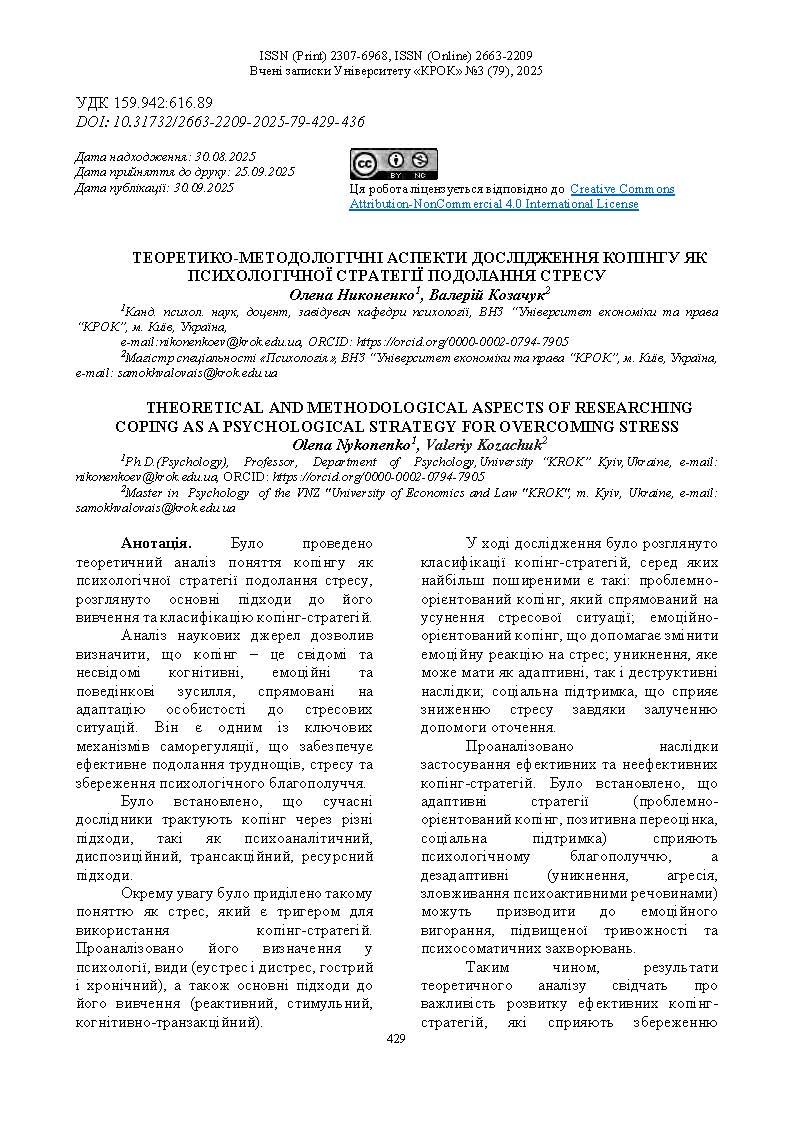THEORETICAL AND METHODOLOGICAL ASPECTS OF RESEARCHING COPING AS A PSYCHOLOGICAL STRATEGY FOR OVERCOMING STRESS
DOI:
https://doi.org/10.31732/2663-2209-2025-79-429-436Keywords:
coping strategies of the individual, personality behavior, psychological adaptation, stress, cognitive theory of the individual, psychoanalytic theory of personalityAbstract
The theoretical analysis of the concept of coping as a psychological strategy for overcoming stress was conducted, the main approaches to its study and the classification of coping strategies were considered. The analysis of scientific sources allowed us to determine that coping is conscious and unconscious cognitive, emotional and behavioral efforts aimed at adapting the individual to stressful situations. It is one of the key mechanisms of self-regulation, which ensures effective overcoming of difficulties, stress and preservation of psychological well-being. It was established that modern researchers interpret coping through various approaches, such as psychoanalytic, dispositional, transactional, resource approaches. Special attention was paid to such a concept as stress, which is a trigger for the use of coping strategies. Its definition in psychology, types (eustress and distress, acute and chronic), as well as the main approaches to its study (reactive, incentive, cognitive-transactional) were analyzed. The study examined the classifications of coping strategies, among which the most common are: problem-oriented coping, which is aimed at eliminating a stressful situation; emotion-oriented coping, which helps to change the emotional response to stress; avoidance, which can have both adaptive and destructive consequences; social support, which helps to reduce stress by involving the help of others. The consequences of using effective and ineffective coping strategies were analyzed. It was found that adaptive strategies (problem-oriented coping, positive reappraisal, social support) contribute to psychological well-being, while maladaptive ones (avoidance, aggression, substance abuse) can lead to emotional burnout, increased anxiety, and psychosomatic diseases. Thus, the results of the theoretical analysis indicate the importance of developing effective coping strategies that contribute to maintaining mental health, adapting to stressful conditions and increasing the overall stress resistance of the individual. In further research, it is advisable to focus on methods of empirical study of coping behavior, as well as on the practical application of the results obtained in the field of psychological counseling and psychotherapy.
Downloads
References
Івашкевич, Е. З. (2019). Здібності особистості до виконання певного виду діяльності як складові компоненти її соціального інтелекту. Актуальні проблеми психології: зб. наук. праць Інституту психології імені Г. С. Костюка НАПН України. Т.6, Вип. 15, 63–74.
Карамушка, Л. М. & Снігур, Ю. С. (2020). Копінг-стратегії: сутність, підходи до класифікації, значення для психологічного здоров’я особистості та організації. Актуальні проблеми психології: зб. наук. праць Інституту психології імені Г. С. Костюка НАПН України. Т.1. Вип. 55, 15–21.
Коваленко, А. Б., & Родіна, Н. В. (2011). Дослідження копінг-поведінки: тенденції та перспективи. Наука і освіта, (9), 110–113.
Никоненко, О. В. (2025). Діадний копінг як чинник сексуального благополуччя під час війни. Наукові перспективи, 7(61), 1282–1293.
Оверчук, В. А. (2018). Копінг-ресурси як чинник збереження психічного здоров’я особистості в подоланні кризових станів. Актуальні проблеми психології: зб. наук. праць Інституту психології імені Г. С. Костюка НАПН України. Т. 11. Вип. 18, 177–192.
Онищенко, В. М. (2020). Трансформація особистості в процесі подолання життєвих криз. Актуальні проблеми психології: зб. наук. праць Інституту психології імені Г.С. Костюка НАПН України. Т. 1. Вип. 56, 118-124.
Сингаївська, І., & Чистякова, М. (2025). Способи подолання дезадаптаційної кризи у вимушених переселенців під час війни. Вчені записки Університету «КРОК», 1(77), 473–480.
Gurtman, M. B. (1994). “The circumplex as a tool for studying normal and abnormal personality: a methodological primer,” in Differentiating Normal and Abnormal Personality, eds S. Strack and M. Lorr (New York, NY: Springer), 243–263.
Schwarzer, R., & Schwarzer, C. (1996). “A critical survey of coping instruments,” in Handbook of Coping, eds M. Zeidner and N. S. Endler (New York, NY: Wiley), 107–132.
Wiggins, J. S. (1979). A psychological taxonomy of trait-descriptive terms: the interpersonal domain. J. Pers. Soc. Psychol., 37, 395–412. doi: 10.1037/0022-3514.37.3.395

Downloads
Published
How to Cite
Issue
Section
License

This work is licensed under a Creative Commons Attribution-NonCommercial 4.0 International License.

